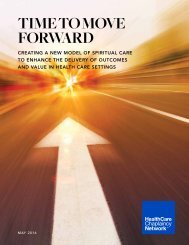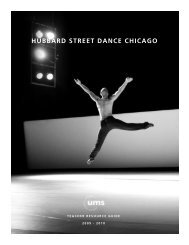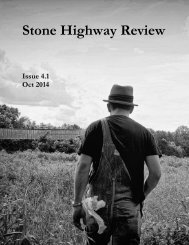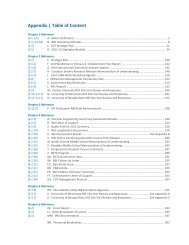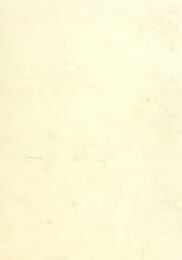ICAME Journal No. 347. The analysis must be exhaustive and systematic. Preferably these analysesshould include relative frequency counts of patterns in contrast, where thecomparison of the patterns is based on similarities of meaning.The paper ends with an evaluation of several aspects of <strong>Fries</strong>’s work.1 IntroductionThe field of corpus linguistics is now generally considered to be a subfield oflinguistics that has developed largely since the early 1960’s when Henry Kuc v eraand W. Nelson Francis created the now famous Brown corpus of one millionwords. Further, it is now regularly presented as developing in opposition to thethen current dominant formalist version of linguistics, which distinguished anidealized ‘competence’ from actual ‘performance’, and which consistentlyemphasized the defective nature of performance while taking the study of competenceas its goal. One consequence of the formalists’ focus on competence hasbeen the regrettable (in the view of corpus linguists) neglect and devaluation ofactual language use (and samples of actual language use) as they created theirdescriptions and theoretical positions.In what follows, I do not want to contradict the general features of the abovesketch of the genesis of corpus linguistics as a discipline, for I recall a number ofconversations with Kuc v era and Francis in which they criticized the absence of‘real language’ from formalist accounts, and also recounted the overt oppositionof the then-dominant advocates of transformational grammar to their project ofgathering the Brown corpus. However, I would like to suggest an additionalinterpretation of the rise of corpus linguistics. In this interpretation, corpus linguisticsis a reassertion of older traditions in the study of language that were currentbefore the rise of formalist approaches. A number of these older traditionsrequired the gathering and study of some coherent body of data – a corpus. Theyincluded at least philology, dialect geography, and anthropological linguistics.(Another discipline that required the use of carefully gathered representativesamples of language, socio-linguistics as conceived by William Labov and hiscolleagues, developed about the same time as the initial stages of corpus linguistics.)Indeed, a significant part of my training at the University of Michigan andwith Kenneth Pike during the late 1950’s consisted of techniques to gather andrecord information in such a way that I would be able to retrieve relevant portionsof the information with relatively little effort. In modern parlance we werebeing taught a kind of data gathering and data retrieval as part of our training asordinary linguists. A further bit of evidence that corpus linguistics constitutes acontinuation of a tradition is the age of the initial proponents. Kuc v era and Fran-90
Charles C. <strong>Fries</strong>, linguistics and corpus linguisticscis were well established in their careers when they began work on the Browncorpus. Randolph Quirk began his work on the survey of English usage (a corpusproject, though not one that used computers at the beginning) well on intohis career. In other words the early corpus linguists were linguists who had beentrained in the older approaches to linguistics and then had the professional statusand the independence and vision to maintain their beliefs and fundamental waysof working in the face of considerable opposition.These days, with the advent of larger computers and their accessibility, whatin those old days was often merely a casual gathering of examples from variousconvenient sources has transformed itself to a much more careful approach tolarge corpora of millions of words, and the discipline which has developed as weprocess these extremely large corpora has been termed ‘corpus linguistics’.However, the size of the corpus and the use of a particular tool, the computer,should not define a discipline. 1 Rather, it seems to me that what defines the disciplineof corpus linguistics should be the assumptions concerning the nature oflanguage, what one considers to constitute evidence concerning the nature of thelanguage being described, and the principles which underlie the gathering anduse of a corpus in linguistic analysis. Of course the size of the corpus and thetools used do affect the sorts of results one may obtain. (In this case, large differencesin size make a qualitative difference in the sorts of results that can beobtained.) But the fundamental approach, the fundamental assumptions aboutscience and about the nature of language, the issues that are considered interesting,and the methodology used to explore those issues should remain roughlyconstant regardless of the corpus size or the tools used. If you grant me this, atleast with a ‘willing suspension of disbelief’, you will agree that corpus linguisticshas roots which extend at least back to the beginnings of modern linguistics.Given the current importance of corpus linguistics within linguistics generally,I thought it might be useful to discuss how corpora were used in one traditionof early work using corpora 2 , and to note some of the issues that wereencountered. Specifically, I want to examine the work of one figure from thefirst half of the twentieth century, Charles C. <strong>Fries</strong>, who consistently workedwith corpora. Before I discuss his approach to corpora I want to say a bit abouthis personal development and his development as a linguist, for his experiencesgreatly affected what he considered important in linguistics, what goals he choseas a linguist, and the methodologies he used to achieve these goals. Because ofthis, in this presentation I will organize the paper around his fundamentalassumptions about language and his goals, and then discuss how these principlesand goals affected his approaches to using corpora in linguistics.91
- Page 1: Charles C. Fries, linguistics and c
- Page 7 and 8: Charles C. Fries, linguistics and c
- Page 9 and 10: Charles C. Fries, linguistics and c
- Page 11 and 12: Charles C. Fries, linguistics and c
- Page 13 and 14: Charles C. Fries, linguistics and c
- Page 15 and 16: Charles C. Fries, linguistics and c
- Page 17 and 18: Charles C. Fries, linguistics and c
- Page 19 and 20: Charles C. Fries, linguistics and c
- Page 21 and 22: Charles C. Fries, linguistics and c
- Page 23 and 24: Charles C. Fries, linguistics and c
- Page 25 and 26: Charles C. Fries, linguistics and c
- Page 27 and 28: Charles C. Fries, linguistics and c
- Page 29 and 30: Charles C. Fries, linguistics and c
- Page 31: Charles C. Fries, linguistics and c



